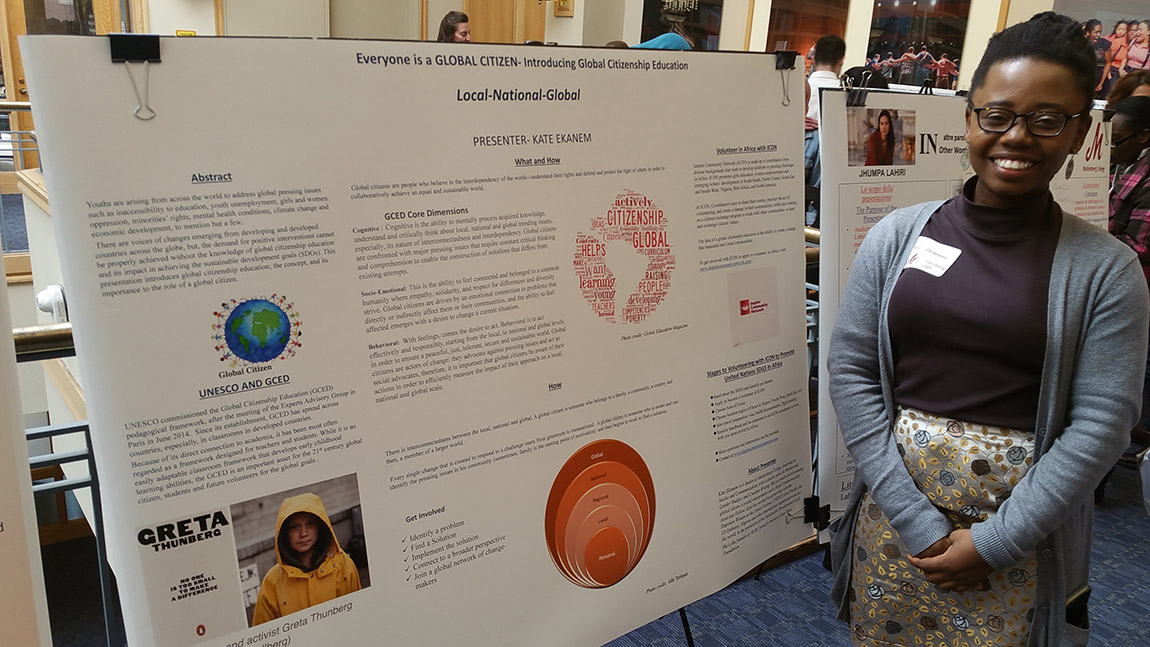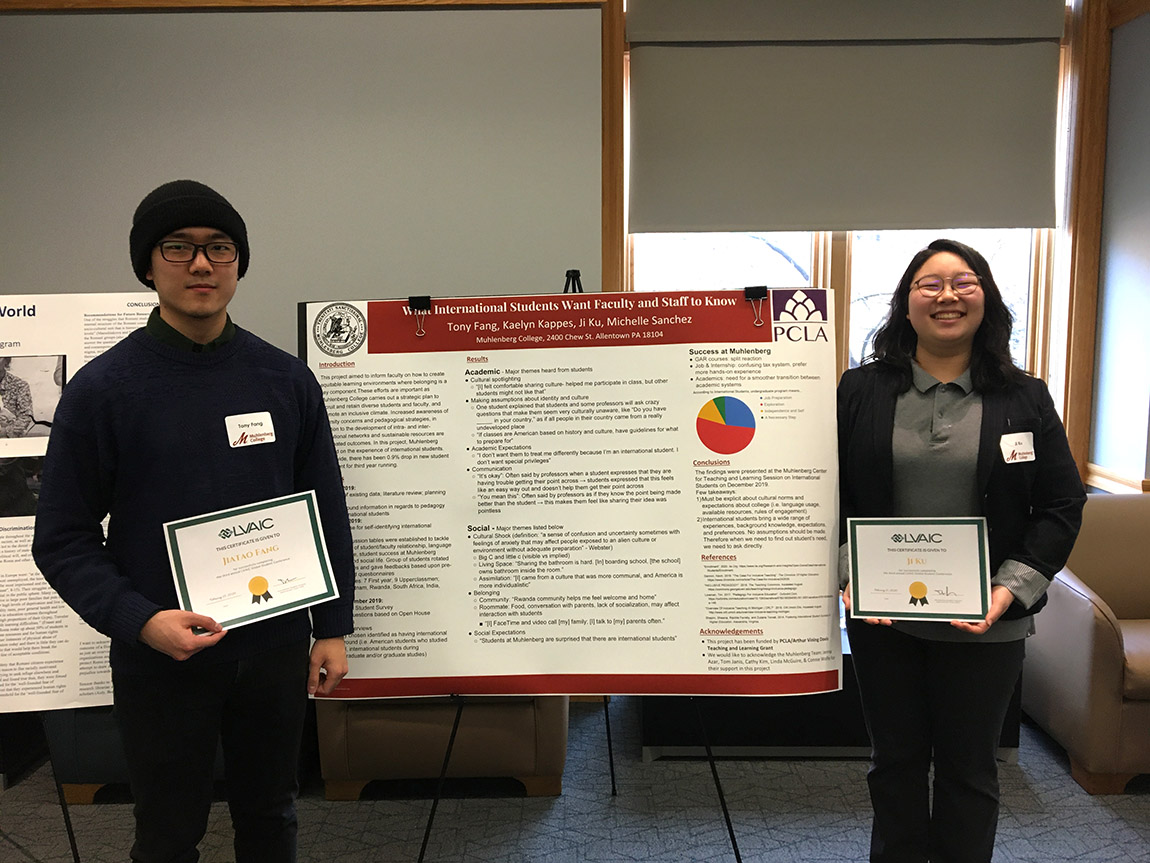Muhlenberg Showcases Global Research
Muhlenberg students presented global education research at the annual LVAIC Global Student Conference.By: Katherine Dickey '22 Saturday, February 29, 2020 08:30 AM
 Kate Ekanem ’21 presents "Everyone is a Global Citizen: Introducing Global Citizenship Education" at the third-annual LVAIC Global Student Conference. Photos by Thomas Janis.
Kate Ekanem ’21 presents "Everyone is a Global Citizen: Introducing Global Citizenship Education" at the third-annual LVAIC Global Student Conference. Photos by Thomas Janis.On Saturday, February 15, students from all over the Lehigh Valley converged on Lafayette College for the third annual Lehigh Valley Association of Independent Colleges (LVAIC) Global Student Conference, formerly the LVAIC International Student Poster Symposium. Originally designed as an opportunity for international students to network and to present their research in a conference setting, the event has become a way for both international and U.S.-based students to showcase their globally focused academic work. This year, five Muhlenberg students exhibited four different projects at the conference, with research topics in the overlapping fields of language, culture, history, politics and education.
The event opened with a light lunch of sandwiches and culturally diverse hors d'oeuvres including dumplings, spring rolls, samosas and empanadas. As the attendees munched away, Markus Dubischar, associate professor of classics at Lafayette, gave the welcome remarks. Dubischar spoke of his own international roots, emphasized how natural it is for cultures to reach out to one another—as even ancient civilizations did—and encouraged the audience to embrace global opportunities.
Farhan Ahmed, Lafayette alumnus ’05 and group technical program manager at Instagram, presented the keynote address about why a global outlook matters in the development of new technology.
“I believe that each of you, through your decisions, through your experiences, through the skills that you’ve built, has a global perspective and an outlook that you can bring to the table that would allow you to solve the world's problems in the next decade,” said Ahmed. “I want you to realize that you have this superpower, and I want you to use that superpower to your advantage.”
“I believe that everyone is a global citizen...we are all human beings with feelings and emotions who feel empathy."
After the keynote, the student presenters moved to their respective stations and shared their projects to attendees and each other as they moved around the space. Kate Ekanem ’21 is a Muhlenberg media & communication major. She is from Nigeria and has founded her own women’s empowerment non-profit known as the Kate Tales Foundation. Ekanem’s project explored what it means to be a global citizen, both through her own perspective and a framework established by UNESCO. One compelling graphic displayed concentric circles, where the innermost ring was labeled as the self, then moved outwards into the different kinds of communities any person is a part of. Ekanem described global citizenship as empathy that moves outwards through all those rings.
“I believe that everyone is a global citizen...we are all human beings with feelings and emotions who feel empathy,” said Ekanem. “I work in an organization that promotes community development, and we train volunteers to become changemakers. And oftentimes people are not really sure if they are good enough to take on that position, to be called young leaders or to be leaders. Some people ask, ‘How do I get involved with The United Nations? Do I need to go to school? Have a Ph.D.? What if I don't have the resources to be in school or to have all of these opportunities?’ We just want to remind people that to be a global citizen, all you need to do is to be a human being who knows how to think and feel about what is affecting you first, then others and so on.”
Brooke Cohen ’20 presented bilingually in Italian and English on her poster about “In Altre Parole” (“In Other Words”) a book written in Italian by Jhumpa Lahiri. Cohen spoke of the pressure Lahiri felt—both as a Bengali woman and a celebrated writer in English—to be perfect in both languages and the relief she felt in going to Florence and learning Italian, a language in which she felt able to make mistakes without being held to a standard of fluency.
“But when she found Italian—and she's not Italian at all—but when she found this language, she finally felt that she’d found the language she could communicate in,” explained Cohen. “And I think that that's just the coolest thing. As someone learning Italian, I think her journey, her journey of making mistakes, messing up, but never stopping because she's in love with it—I get that completely. That's how I feel. And I think it does open you up to a whole ‘nother world.” Cohen’s research was originally a project for an advanced Italian course that she reformatted to present for this conference. The project includes illustrations from Ella McGorry ’20.
Olivia Garcia ’20, an international studies and Spanish double major and dance minor, found a project that spanned all her interests. Her project, co-authored by Cathy Ouellette, associate professor of history, was called “Understanding Argentine Identity in the 21st Century” and focused on the re-emergence of tango in Argentina following the economic crisis there in 2001. Garcia studied abroad in Argentina for part of the summer between her sophomore and junior years, and when she came back, she found herself really pivoting her international studies major towards focusing on Latin America.
“I think one of the more interesting and difficult things about this project was that there was no like one source material or paper that had the answer. It was really about reading very different parts,” said Garcia. “So I would read a lot about political situations and economic situations that happened at the time period. And then I would read about the history of the tango. And then I would read about performance theory as a discipline. It was really cool and interesting to put those puzzle pieces together. That's sort of the fun of research, that you're not looking for one paper where you circle the quote and you’re like ‘I found it!’ You're finding it as you go and keep adding more to it.” Garcia’s research was funded through a summer research grant from the Muhlenberg Dean of Academic Life.
Tony Fang ’20 and Ji Ku ’20 presented research they performed with Kaelyn Kappes ’21 and Michelle Sanchez ’20, entitled “What International Students Want Faculty and Staff to Know.” Their project was based on their review of existing literature and data they had collected through an open house, a survey of Muhlenberg international students and faculty interviews. Ku and Fang originally presented their results at the Muhlenberg Center for Teaching and Learning Session on International Students in December 2019.

Jiatao Fang ’20 and Ji Ku ’20 display their research poster, “What International Students Want Faculty and Staff to Know.”
When asked about the responses they received and the suggestions for professors, Ku said, “There's a broad spectrum. But at the end of the day, I think what we were able to get out of it is the two things that we mention here.” She gestured at the poster. “We have to be very explicit about our cultural norms. Rather, about our available resources, rules or language usage that you set so that the students are aware of what the United States cultural norms are, because they do bring a lot of different norms to it. And the second thing is, again, [the students] bring a wide range of experiences and cultural backgrounds. It is best not to make assumptions about anything. It's really, really nice if [professors] ask about what students need. If they identify the students’ needs, they'll be able to tackle those needs rather than making assumptions about it.” This project was funded through a PCLA/Arthur Vining Davis Grant.
Presentations from other colleges also covered a gamut of global experiences. One young woman spoke about her experiences as a hijabi woman in a very personal way, and another presented about the effectiveness (or lack thereof) of food aid in refugee camps in Uganda, driven almost entirely by her personally collected data. One presentation explored the histories of allopathic and alternative medicine in Chile, while yet another looked at how music might motivate students to learn other languages.
Following the poster symposium, the assembly moved to round table discussions, led by students from each institution. Muhlenberg’s delegation led two parallel discussions on the same topic, an extension of Ku and Fang’s international student experiences presentation. The two tables’ discussions were facilitated by Ku, Ekanam and Fang, as well as Tom Janis, director of international student support; Cathy Kim, senior lecturer of education; and Linda McGuire, professor of mathematics and computer science. Participants were asked to consider case studies of situations that international students might come across and asked for solutions of how they might fight the alienation and frustration that result.
Following this dialogue, delegates from each college granted certificates of achievement to their respective institutions’ presenters, and as the many presenters squeezed tight to fit in one picture, it was clear that this conference had helped to empower a particularly special group of students. Muhlenberg will host the fourth annual LVAIC Global Students Conference next spring.
